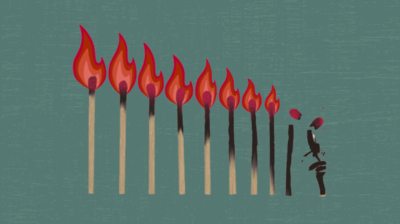What is fatigue and when should I take it seriously?

Feeling tired all the time can be frustrating, confusing, and sometimes overwhelming. Fatigue can affect your ability to think clearly, do everyday tasks, and enjoy life. Feeling fatigued is not the same as feeling a bit sleepy. It can have a significant impact on your mental and emotional well-being.
In this article, you will find information on what fatigue is, how it feels, and how to distinguish it from everyday tiredness. You will find clear, up-to-date answers to common questions, including:
What is the difference between tiredness and fatigue?
What are the three types of fatigue?
What is the difference between fatigue and depression?
What kinds of physical chronic illnesses can cause fatigue?
What is the difference between fatigue and chronic fatigue syndrome (CFS)
What is the difference between tiredness and fatigue?
Feeling tired from time to time is normal and does not necessarily indicate that you are unwell. If you do not live with a physical chronic condition, feeling tired a lot or most of the time may be a sign that you are not getting enough rest or sleep. However, the fatigue you can experience when living with certain physical chronic conditions might not improve with rest.
Everyone’s baseline energy level, or the amount of energy you have when you are well and rested, is different. If you are living with a chronic condition that causes your energy to decrease, you may experience a lower energy baseline than your peers.
Unlike tiredness in someone who is well, decreases in energy associated with a physical chronic condition can interfere with your ability to participate in work, education, social activities, and even self-care over a long period of time. For some people, persistent fatigue can affect a person’s ability to reach their goals, such as moving out of the family home, getting a job, or going to college.
What are the three types of fatigue?
Fatigue is often grouped into three main types: physical, mental or emotional. Each type can feel different, and you might notice signs that match one or more of them. Here are some common signs to look out for:
Some signs of mental fatigue
- Short-term memory problems
- Poor concentration
- Low motivation
- Slowed reflexes and responses
Some signs of physical fatigue
- Muscle weakness
- Sore, achy, or tense muscles
- Appetite loss
- Weakened immune system or feeling run down
- Blurry vision
- Dizziness
- Shakiness
- Headaches
- Nausea or upset stomach
Some signs of emotional fatigue
- Feeling moody, irritable or frustrated
- Increase in negative or distorted thinking
- Feeling powerless or trapped
- Difficulty regulating emotions, leading to tearfulness, outbursts or freezing
- Difficulty expressing the expected emotional response at work or in other social situations, sometimes called “emotional labour”
What is the difference between fatigue and depression?
Fatigue is a common symptom of low mood or depression, but on its own, it isn’t enough for a diagnosis of major depressive disorder (MDD). To be diagnosed with MDD, a person must experience decreased energy alongside other symptoms, such as:
- Depressed mood for a prolonged period
- Loss of interest or pleasure in activities that were previously enjoyable
- Changes in appetite or eating behaviour, leading to weight loss or gain
- Persistent difficulties sleeping or excessive sleeping
- Feeling worthless or guilty
- Decreased concentration
Similarly, while people with fatigue can also experience depression, this is not always the case.
Different reasons for withdrawing from activities
When someone with depression experiences fatigue as well as other symptoms like those listed above, they may withdraw from or avoid activities. This withdrawal is often accompanied by a loss of interest in or motivation to do these activities. However, for people living with a physical chronic condition, withdrawal from activities may be caused by the decrease in energy itself rather than by low mood or loss of interest.
What kinds of physical illnesses can cause fatigue?
While this is not an exhaustive list, some long-term health conditions that can cause fatigue include:
- Under-active thyroid
- Chronic pain
- Cancers
- Respiratory conditions, such as cystic fibrosis or asthma
- Autoimmune conditions, like rheumatoid arthritis, coeliac disease, and Crohn’s disease
- Chronic fatigue syndrome or myalgic encephalomyelitis
- Long COVID
- Neurological conditions, including brain injuries
If you’re unsure about the cause of your fatigue, it is best to see a GP. Your GP will be able to carry out simple investigations to detect the underlying cause of your fatigue, and exclude any of the physical health conditions listed above.
What is the difference between fatigue and chronic fatigue syndrome (CFS)?
Fatigue is often described as “chronic fatigue” when it lasts for more than six months. While chronic fatigue can have a variety of different causes, chronic fatigue syndrome (CFS) is classified as a disease of the nervous system within the International Classification of Diseases 11th Revision (ICD-11). CFS is also known as myalgic encephalomyelitis or ME.
Research shows that people with CFS experience fatigue that has a significant impact on their ability to participate in all areas of life. According to the medical definition of CFS provided by the Centres for Disease Control and Prevention (CDC), a diagnosis of the condition can only be made when:
- Fatigue leads to a substantial reduction in your capacity to take part in work, school, social, or personal activities compared to before the illness
- The fatigue is not caused by extreme effort (like overtraining or working long hours) and is not improved by rest or sleep.
- Physical, mental, or emotional effort makes symptoms worse for days or weeks, 12 to 48 hours after the activity. This is called post-exertional malaise (PEM) or an energy “crash.”
- You’ve had at least one of the following symptoms for six months or more:
- Trouble with memory or concentration (often called “brain fog”)
- Symptoms that worsen when standing or sitting upright
- Muscle or joint pain
- New or unusual headaches
- Chills or night sweats
- Nausea
- Visual disturbances
- Sensitivity to light or sound
- Frequent sore throat
CFS or ME is a serious and often disabling medical condition. If you think your fatigue might be something more than just tiredness, it’s important to speak to a healthcare professional. Your GP or another appropriate health professional should investigate all other possible physical causes of fatigue, before making a diagnosis of CFS or ME.
Sleep difficulties
If you’re struggling with fatigue, it’s important to seek medical advice. Sometimes there’s a straightforward reason for feeling tired most or all of the time, and a health professional can help identify and address it. One of the most common causes of fatigue is not getting enough sleep or having poor-quality sleep. Practising good sleep hygiene, such as keeping a consistent bedtime and wake-up time, and avoiding screens or phone scrolling in the hour before bed, can make a real difference for some people. Better sleep quality can, in turn, help reduce the ongoing exhaustion you might be feeling.
Reaching out for support
If you’re experiencing ongoing fatigue that is not relieved by sleep, it is a good idea to make an appointment with your GP. They can help you better understand what might be causing your exhaustion.
If you’re struggling with long-term fatigue, you’re not alone, and it’s not all in your head. Whether it’s linked to your physical health, emotional wellbeing, or something still unclear, your experience is valid and deserves care and attention
If it is taking time to find answers or the right medical support, you might also find it helpful to reach out for emotional support. Living with long-term fatigue can be difficult, especially when it affects your ability to manage everyday tasks.
Find out more information on how to access mental health support, from instant messaging support services to finding an accredited counsellor or psychotherapist.
You can also find helpful tips and coping strategies in our articles on minding your energy with chronic fatigue symptoms and finding support for your chronic illness.
Feeling overwhelmed and want to talk to someone?
- Get anonymous support 24/7 with our text message support service
- Connect with a trained volunteer who will listen to you, and help you to move forward feeling better
- Whatsapp us now or free-text SPUNOUT to 50808 to begin.
- Find out more about our text message support service
If you are a customer of the 48 or An Post network or cannot get through using the ‘50808’ short code please text HELLO to 086 1800 280 (standard message rates may apply). Some smaller networks do not support short codes like ‘50808’.






